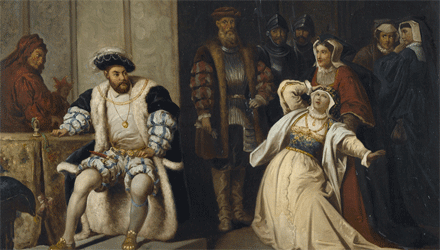
In The Rule of Moderation, author Ethan Shagan traces the paradoxical ideal of moderation, and how England came to represent reason, civility, and moderation through aggressive and even violent policies. He sat down with us to talk about his findings.
What inspired you to research this topic?
I first got interested in the problem of moderation ten years ago, when I was writing a book on the English Reformation and I stumbled across one of the wildest historical events I’d ever seen: Henry VIII’s execution of three Protestant ministers and three Catholic priests, at the same time and facing one another, to prove that his Church of England was a moderate middle way between them. When I finished the Reformation book, I decided to write a little article about this execution and the version of “moderation” it represented, in which moderation seemed to be something the government did to people rather than a virtue people possessed. Then, a few months later while I was writing the article, I went to a conference about gender in early modern England and I heard a talk about how women were imagined as incapable of ethical moderation, so they needed the strong government of fathers and husbands to control them instead. It occurred to me that this was the same version of moderation! At that moment I realized that instead of writing a little article about the violence of the English Reformation, I was writing a big book about the ideology of authority in English history.
How did you decide which subjects to include in the book?
One of the most fun things about this project was that the ideal of moderation was everywhere in early modern England, so I could track it down in lots of different places that I found interesting and worth researching for their own sake. A colleague in American history told me that early English colonies were often described as moderate, so I began researching the ideology of imperialism and I ended up writing a chapter about how the English empire began as an attempt to moderate the excesses of the New World. I read an early modern sermon that advocated “moderate” religious persecution and described religious toleration as extremism; I was so surprised that I ended up writing a whole chapter about how toleration became moderate in the later seventeenth century.
Basically, the argument of the book is that moderation acquired new and distinctively aggressive meanings in the context of the English Reformation, but from there it expanded into lots of different areas. So, in addition to religion, I chose to focus my research on issues like empire, political freedom, and emergent capitalism that seemed to me unquestionably central to English history.
How does The Rule of Moderation fit into your larger intellectual project?
I’ve always been interested in how ideas work in the real world, and that’s what this book is about. It’s not really an “intellectual history” in the technical sense, because it doesn’t trace genealogies of ideas or explore technical debates between thinkers. Instead it takes a single idea that permeated English culture and explores the ideological work of that idea in different settings, with spectacularly unexpected results. In my earlier work, I wrote a lot about how religious ideas became detached from their moorings and were put to use by people who didn’t really believe in them much at all. Here I take an ethical ideal—the ideal of moderation—and explore how it was put to the task of governance by people with a wide variety of ideological commitments. The Rule of Moderation is in some sense the deep history of Big Brother, but it’s also an attempt to show how a concept which today is almost entirely innocuous could have authorized so much violence in the sixteenth and seventeenth centuries.
Latest Comments
Have your say!